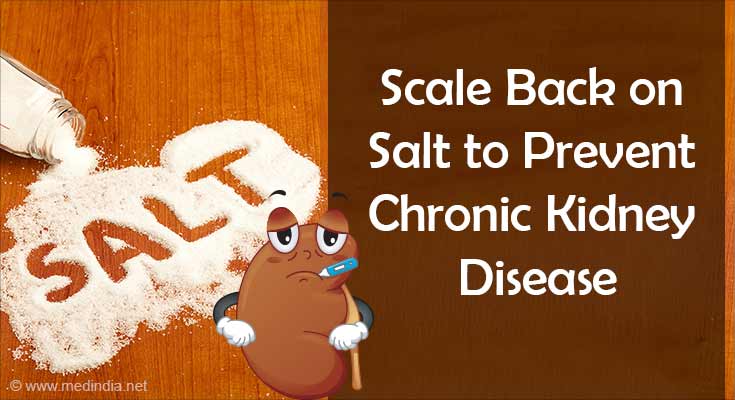-
An excessive amount of salt consumed daily may cause chronic kidney disease (CKD), a condition of kidney dysfunction leading to kidney failure - The sodium component of the salt alters several biochemical pathways that can gradually result in CKD
- A balanced diet with moderate salt intake and a healthy lifestyle can promote kidney health and overall well-being
Salt, the crystalline kitchen staple composed of sodium chloride, continues to be a fundamental part of our diet and daily lives. While salt is an essential part of our diet for several body functions, too much of it has been connected to several health problems, including kidney diseases.
Self-reported frequency of adding salt to food before eating can significantly increase the risk of chronic kidney disease, reveals a new research (1✔ ✔Trusted Source
Self-Reported Frequency of Adding Salt to Food and Risk of Incident Chronic Kidney Disease
).
What is Chronic Kidney Disease?
Chronic kidney disease (CKD) is a condition characterized by a progressive decline in kidney function over time. CKD can progress slowly over many years and, in its later stages, can lead to kidney failure and require treatments like dialysis or kidney transplantation.
Advertisement
Several factors can contribute to the development of CKD such as high blood pressure, diabetes, glomerulonephritis, and polycystic kidney disease. Managing CKD involves controlling the underlying conditions with a healthy lifestyle, a balanced diet low in salt, and, medications to manage symptoms and in severe cases dialysis and transplantation.
How Additional Salt Intake Causes Chronic Kidney Disease?
The study team analyzed health data from 465,288 individuals who provided their health information to the UK Biobank, a UK health database. The participants in the study did not have chronic kidney disease at the start of the investigation, and their ages ranged from 37 to 73 years old, with an average age of roughly 56.
The health outcomes were compared to the frequency with which participants reported adding salt to their food: never or seldom, sometimes, frequently, or always.
Researchers observed that compared to those who indicated they never or sporadically added salt to food, those who added salt constantly had the largest increased risk of developing chronic kidney disease.
The positive correlation between habitual high sodium consumption and an elevated risk of chronic kidney disease (CKD) is explained by multiple molecular mechanisms such as:
- Aldosterone activation
- Extracellular fluid volume
- Renin-angiotensin-aldosterone system disturbances
- Failure of the peripheral vasculature’s normal autoregulation
- Elevated levels of oxidative stress
- Proinflammatory cytokines
- Intrarenal angiotensin II
- Increased arterial stiffness and endothelial dysfunction
Furthermore, the study discovered that those who added salt to their diet had higher odds of being obese, having cardiac issues, diabetes, or smoking at the beginning of the trial. Consuming a lot of salt has also been connected to an increased risk of type 2 diabetes, cardiovascular disease, and early mortality.
Advertisement
The results aligned with multiple investigations utilizing 24-hour urine specimens, wherein favorable correlations between sodium consumption and a deterioration in kidney function were noted.
In summary, a daily extra sprinkle of salt could slowly progress toward chronic kidney disease. Thus, moderation and a balanced diet remain key in promoting kidney health and overall well-being.
Advertisement
Reference:
- Self-Reported Frequency of Adding Salt to Food and Risk of Incident Chronic Kidney Disease – (https://jamanetwork.com/journals/jamanetworkopen/fullarticle/2813410)
Source-Medindia



